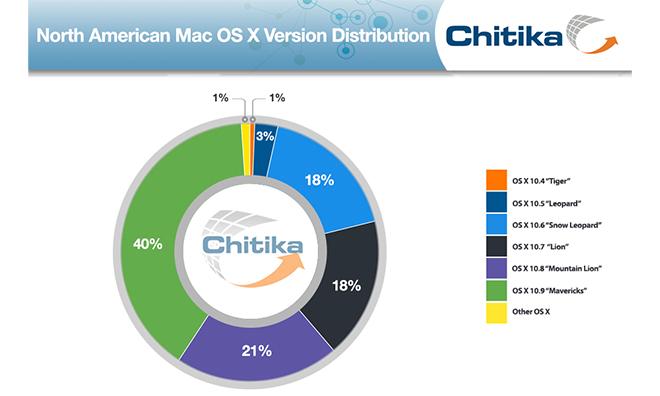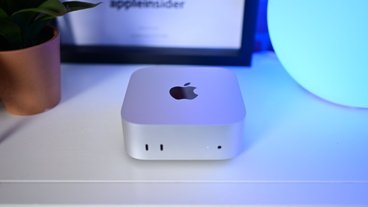The rate at which Mac owners are upgrading to Apple's OS X 10.9 Mavericks has far outperformed the operating system's predecessor — OS X 10.8 Mountain Lion — with one report saying the latest OS is now running on over 40 percent of active Macs.
After five months of availability, OS X 10.9 Mavericks now generates just over 40 percent of all North American OS X-based Web traffic handled by ad network Chitika, almost doubling Mountain Lion's current 21 percent share.
By comparison, the last-generation OS X 10.8 Mountain Lion took nearly 14 months to reach a 34 percent share and was only at 26.8 percent after seven months on the market.
As for older versions of OS X, 10.7 Lion and 10.6 Snow Leopard both account for 18 percent of Mac traffic, while OS X 10.5 Leopard is at 3 percent. The almost nine-year-old OS X 10.4 Tiger is still running on one percent of machines, while "other OS X" takes the last percent.
In October 2013, one month after Mavericks' release, the operating system saw an adoption rate three times that of Mountain Lion. Possibly contributing to the uptick in adoption is Apple's decision to make Mavericks a free upgrade.
Chitika notes that while Mavericks' 40 percent is commendable, the statistic is nowhere near Apple's iOS 7, iterations of which account for more than 80 percent of traffic for the platform. The firm speculates a variety of factors play a role in the noticeable gap, including hardware incompatibility, differing device refresh cycles and user demographics.
Another interesting point is that the iOS update mechanism is much more aggressive than OS X. For example, iPhone, iPad and iPod touch users are solicited to upgrade with pop-ups and push notifications, while older OS X version do not have the same assets.
Things could change with OS X 10.10, however, as Mavericks includes auto update features built into the Mac App Store, as well as Notification Center and app badge carryovers from Mountain Lion.
 AppleInsider Staff
AppleInsider Staff








 Malcolm Owen
Malcolm Owen
 Christine McKee
Christine McKee

 Chip Loder
Chip Loder
 Marko Zivkovic
Marko Zivkovic
 Wesley Hilliard
Wesley Hilliard









36 Comments
Auto update sounds good to me. I no longer have to worry about whether I’m running the latest version of apps on my iPad. Having this on OS X makes my life easier.
That's because it's free. My idea ;-)
Possibly contributing to the uptick in adoption is Apple's decision to make Mavericks a free upgrade.
That is exactly the reason for the high adoption rate. A free upgrade? There are very few reasons to turn a free offer down.
[quote name="AppleInsider" url="/t/174541/adoption-of-os-x-10-9-mavericks-significantly-outpaces-10-8-mountain-lion#post_2503623"]Possibly contributing to the uptick in adoption is Apple's decision to make Mavericks a free upgrade.[/QUOTE] I appreciate AI not wanting to jump to any conclusions but this seems like more than a [I]possibility[/I]. [QUOTE]Another interesting point is that the iOS update mechanism is much more aggressive than OS X. For example, iPhone, iPad and iPod touch users are solicited to upgrade with pop-ups and push notifications, while older OS X version do not have the same assets.[/QUOTE] I know plenty of Mac users that weren't even aware that MAS exists of that Mavericks was a free download. These tend to be long-time Mac users who are not very tech savvy, but given enough time these people will learn or die off so it's a short term problem. [quote name="lkrupp" url="/t/174541/adoption-of-os-x-10-9-mavericks-significantly-outpaces-10-8-mountain-lion#post_2503637"]Auto update sounds good to me. I no longer have to worry about whether I’m running the latest version of apps on my iPad. Having this on OS X makes my life easier.[/quote] Even Mac OS X betas now show up in the Mac App Store like a regular update. They have really made it streamlined and simple. [quote name="Ireland" url="/t/174541/adoption-of-os-x-10-9-mavericks-significantly-outpaces-10-8-mountain-lion#post_2503645"]That's because it's free. My idea ;-)[/quote] Delusional, much? :no:
My big 2007 8 Core Mac Pro won't even run Mountain Lion. I love this machine and was so proud to have such a wonderful powerhouse. Now it is dying. Apple helped me with that. Eventually Lion will be so obsolete that I won't be able to use the internet. Sucks.
I am gonna buy another Mac Pro Box. One that will run Mavericks. I plan to not buy the new Mac Pro Model. I think the solid state drives are not far enough along to meet the storage demands I like. The external option is not what I like. Too much desk space and AC Adapters.
I like multiple drives with multiple OS. And two massive identical storage drives. The old mac pro was good at the internal drives. You could have 6 total if you really wanted it. 6 4tb drives. Nice!
If my 2007 could run Mountain Lion in a stable manner I would keep it on my machine. I got it hacked to run but it would crash with certain Apple programs like iPhoto. I gave up and decided it wasn't worth it. I would have to do the same thing and with even more work on Mavericks.